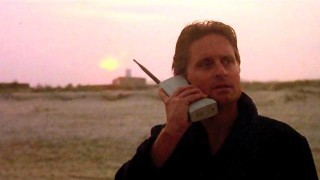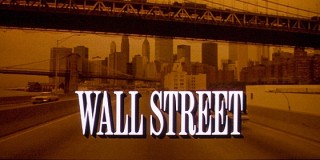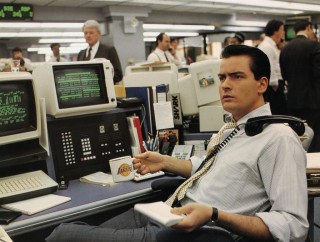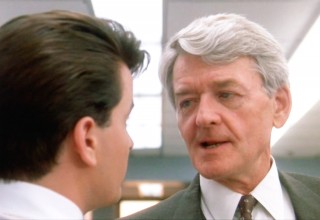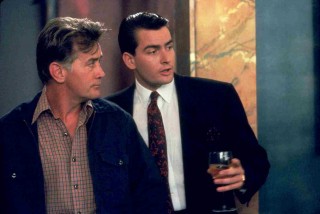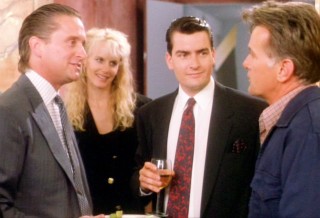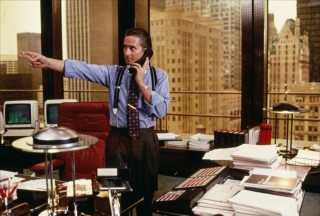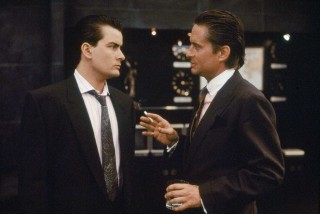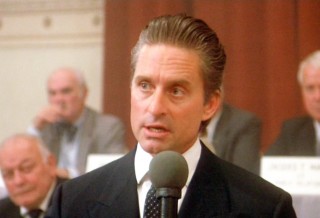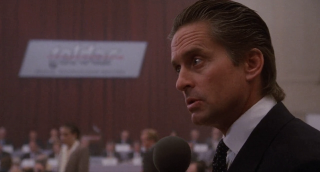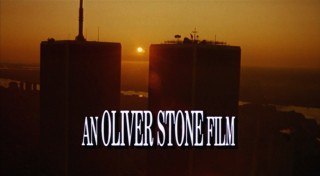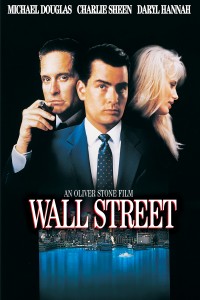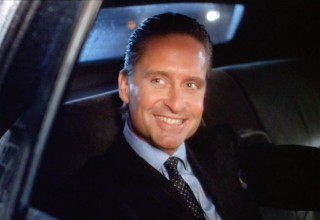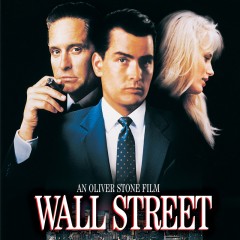
From the Chairman of the Board, Frank Sinatra, singing “Fly Me to the Moon” over the opening credits to the Board of Teldar Paper at the annual stockholders meeting where “Greed is right,” and from the showdown in Central Park to the battle of father versus mentor and the morality of Lou, it all adds up to Wall Street, a film that will always be relevant so long as there is either a stock market or someone looking to make a quick buck.
And, no, the two are not mutually exclusive.
Before diving into the minutia of Wall Street, the overall feel of the film should be examined: the locations, the technology, the music, and even the time period all play their parts superbly.
There is but one location for the film, New York, New York, the city so great they named it twice. Director Oliver Stone, fresh off completing Platoon, changed one jungle for another; the concrete variant of the white collared New York streets and buildings upon which money is made and lost on an almost hourly basis, just as lives lost during the Vietnam War.
The technology used in the film is dated to say the least. Everything that can be seen on the computers in the film can now be accomplished with a smartphone, one of which would also probably have more computing power in it than the totality of computers shown in the film. The famous “Wake up, Call,” takes place with the now dinosaurish Motorola DynaTac 8000X, or in layman’s terms, a brick phone. But during the filming in 1986 and it’s subsequent release in 1987, this was the pinnacle of mobile phone technology.
There was also a robot serving drinks at Gordon Gekko’s party house in the Hamptons. A robot! This movie being what it was, the writers probably thought that robots would be in every household by now. And perhaps, based on the mechanization of practically everything in most houses, they are, but they don’t look like robots. They just function like them, although I’d still prefer that my toaster or coffee maker doesn’t talk to me.
Moving to the music, Steward Copeland composed the original score and it is one of the more unique movie scores he’s ever done. A former member of the now-defunct, often-rumored-to-reunite-band The Police, Copeland captures everything that isn’t taken care of by the actual soundtrack featuring artists like Frank Sinatra, Kenny G, and Talking Heads, as well as two pieces created by David Byrne and Brian Eno. The fact that such an eclectic group of songs makes up the background to this movie just gives it that much more depth.
But the real depth of the film, the reason it still holds relevance, are the characters within the film.
Charlie Sheen stars as Bud Fox, a young stockbroker trying to break out of cold-calling and break into bigger game and larger gains. He does so with a battle of two fathers; the aforementioned Gekko as played by Michael Douglas and Carl Fox, Bud’s actual father, played by Charlie’s actual father, Martin.
Douglas’ portrayal of Gekko is, by my account, flawless. Once Bud gets into his door, he becomes a mentor, or father figure of sorts. But Gekko’s and in fact Douglas’s stunning portrayal of the character has made quite the impact on economics in America since the film debuted. As Douglas himself has said, people will come up to him and say that Gekko was the reason they got into the market and became stockbrokers. Douglas always reminds them that Gekko was the bad guy. That doesn’t appear to matter, although it gives some credence to the brilliance of his role as Gekko.
Carl Fox is the blue collar union leader who tries to instill in his son a work ethic that Bud doesn’t see as equal to the dirty buck he’s making by doing things the Gekko way.
One potential third father figure exists in the movie in Lou Mannheim, played by Hal Holbrook, representing the quiet voice of morality. Lou gives more philosophical advice than the others, but it’s basically on par with what Carl is saying. Before moving onto the writing and lines that Bud, Carl, and Gekko say, which are all wonderful, here’s some of Lou’s philosophical genius;
“Stick to the fundamentals. That’s how IBM and Hilton were built. Good things, sometimes, take time.”
“You can’t get a little bit pregnant.”
“Kid, you’re on a roll. Enjoy it while it lasts, ’cause it never does.”
“The main thing about money, Bud, is that it makes you do things you don’t want to do.”
And the coup de grace, during the final moments of the film, “Bud… Bud I like you. Just remember something. Man looks in the abyss, there’s nothing staring back at him. At that moment, man finds his character. And that is what keeps him out of the abyss.”
But as great as Lou’s lines are and as powerful as they could be, they are nothing to the stuff that the others deliver. In fact, before I go on, in any other film with different actors, Lou’s lines would be the ones that everyone remembers. The kicker is that they should be the ones everyone remembers because they’re all well written, solid pieces of advice!
Bud has just three great lines, which just happen to be him talking to his father, himself, and Gekko.
He tells his father that “there’s no nobility in poverty anymore, y’know. One day you’re going to be proud of me, you’ll see…” He tells himself that “life all comes down to a few moments,” and lastly he tells Gekko, “I don’t know. I guess I realized that I’m just Bud Fox. As much as I wanted to be Gordon Gekko, I’ll always be Bud Fox.”
Carl has some good lines, but his best is his part of the conversation he has with Bud on the way to the courthouse, which is more of an anecdote than wisdom, although there is a lot of truth in it.
“You told the truth and gave the money back. All things considered in this cockamamie world, you’re shooting par…”
“Dad, I’m going to jail and you know it.”
“Yeah, well, maybe that’s the price, son. It’s gonna be hard on you, that’s for sure. But maybe in some kind of screwed-up way, it’s the best thing that could’ve happened to you. You stop going for the easy buck and produce something with your life. Create instead of living off the buying and selling of others.”
But as I said, Michael Douglas as Gordon Gekko, the bad guy in the film, is the one most people remember, and with good reason – he has the best lines and his performance shines throughout.
Quotes from Gekko like “the most valuable commodity I know of is information,” and “ever wonder why fund managers can’t beat the S&P 500? ‘Cause they’re sheep — and the sheep get slaughtered,” are memorable. But his description of wealth is probably the reason that he was the inspiration for a generation of Wall Street go-getters.
“Wake up, will ya, pal? If you’re not inside, you’re outside, okay? And I’m not talking a $400,000 a year working Wall Street stiff flying first class and being comfortable, I’m talking about liquid. Rich enough to have your own jet. Rich enough not to waste time. Fifty, a hundred million dollars, buddy. A player, or nothing. Now, you had what it took to get into my office; the real question is whether you got what it takes to stay.” Well, as we know, Bud didn’t quite have it, but maybe others do, or at least attempted. “Liquid” is something that we could all live well enough on, based upon his description.
Oliver Stone’s script had a famous line from Gekko to Bud, during the infamous wake up call scene, in which Gekko says, “Money never sleeps.” And of course you can’t forget his other great lines such as;
“You’re walking around blind without a cane, pal. A fool and his money are lucky enough to get together in the first place.”
As well as Gekko’s answer to Bud Fox, when he asks him “How much is enough?”
“It’s not a question of enough, pal. It’s a zero sum game, somebody wins, somebody loses. Money itself isn’t lost or made, it’s simply transferred from one perception to another. Like magic. This painting here? I bought it ten years ago for sixty thousand dollars. I could sell it today for six hundred. The illusion has become real, and the more real it becomes, the more desperately they want it. Capitalism at its finest.”
But the gold in this movie is quite possibly the most misquoted line in cinema history, as Gekko never plainly said “greed is good.” Below is the full text of his famous speech at the Teldar Paper stockholder’s meeting.
“Well, I appreciate the opportunity you’re giving me Mr. Cromwell as the single largest shareholder in Teldar Paper, to speak. Well, ladies and gentlemen we’re not here to indulge in fantasy but in political and economic reality. America, America has become a second-rate power. Its trade deficit and its fiscal deficit are at nightmare proportions. Now, in the days of the free market when our country was a top industrial power, there was accountability to the stockholder. The Carnegies, the Mellons, the men that built this great industrial empire, made sure of it because it was their money at stake. Today, management has no stake in the company! All together, these men sitting up here own less than three percent of the company. And where does Mr. Cromwell put his million-dollar salary? Not in Teldar stock; he owns less than one percent. You own the company. That’s right, you, the stockholder. And you are all being royally screwed over by these, these bureaucrats, with their luncheons, their hunting and fishing trips, their corporate jets and golden parachutes.
“Teldar Paper, Mr. Cromwell, Teldar Paper has 33 different vice presidents each earning over 200 thousand dollars a year. Now, I have spent the last two months analyzing what all these guys do, and I still can’t figure it out. One thing I do know is that our paper company lost 110 million dollars last year, and I’ll bet that half of that was spent in all the paperwork going back and forth between all these vice presidents. The new law of evolution in corporate America seems to be survival of the unfittest. Well, in my book you either do it right or you get eliminated. In the last seven deals that I’ve been involved with, there were 2.5 million stockholders who have made a pretax profit of 12 billion dollars. Thank you. I am not a destroyer of companies. I am a liberator of them! The point is, ladies and gentleman, that greed, for lack of a better word, is good. Greed is right, greed works. Greed clarifies, cuts through, and captures the essence of the evolutionary spirit. Greed, in all of its forms; greed for life, for money, for love, knowledge has marked the upward surge of mankind. And greed, you mark my words, will not only save Teldar Paper, but that other malfunctioning corporation called the USA. Thank you very much.”
As you’ll note, he said “that greed, for lack of a better word, is good.” People all over the world seem to have forgotten the “for lack of a better word,” part of the quote, yet it is integral to the speech he gives as a whole.
And let us not forget that “Blue Horseshoe loves Anacott Steel.” And that “Blue Horseshoe loves Bluestar Airlines.” But what does “blue horseshoe” mean? I’m not sure, other than it appears to be some kind of code for insider trading that Gekko has set up with the Wall Street Chronicle to let them know that a certain stock is in play.
Gekko and Bud’s final scene together is the most pivotal conversation in the movie. It’s where we learn that bravado can have its faults and that in 1987, Gekko wasn’t worried about someone being wired, because it wasn’t too common a practice back then.
“I opened the doors for you! Showed you how the system works! The value of information! How to *get it*! Fulham oil! Brant resources! Geodynamics! And this is how you fucking pay me back you COCKROACH? I GAVE you Darien. I GAVE you your manhood. I gave you EVERYTHING! You could’ve been one of the great ones Buddy. I looked at you and saw myself.”
In this scene, we learn everything and all of it points to Gekko being guilty as sin, yet for those stockbrokers who go into the racket because of Gekko, and to many of those who remember the movie, it doesn’t matter that Gekko was guilty, because he was so cool and so smooth. Guilty may be able to stick to Gekko as a verdict in the court of law, but in the minds of those who saw the film, the guilt just slides right off Gekko. He’s practically invincible in our memories.
Having covered most of the big stuff, it’s time to take a deeper look at the little things. Wall Street was the first feature film to show a character using a mobile phone. Gekko’s famous “greed” speech was inspired by a real life speech given by Ivan Boesky, a stock trader who had a big role in the Wall Street insider trading scandal and is quoted in his commencement speech at the University of California, having said, “Greed is all right, by the way. I want you to know that. I think greed is healthy. You can be greedy and still feel good about yourself.”
The screenplay for Wall Street was originally titled “Greed,” but I am glad they changed the title, as it seems a bit too on the nose. But decisions like that are for history to decide. The movie still holds up. People who are just now watching it for the first time and through future generations may laugh at the technology, but they will still marvel at Gordon Gekko, the villain we love to love.
This movie says a lot about ethics, wealth and power. It’s relevance should never be questioned, because it was well written and a lot of people can relate to Bud, looking for the easy way out, although seldom is the easy way out actually easier. A lot of people still want to be Gekko and, on some level, many professionals have had a conflict between the things their mentor says and the things they’ve learned from family, leaving them to develop a course of action on their own.
This movie is, for lack of a better word, brilliant.
And for your information, Gordon Gekko’s birthday is May 6th.
Read the Secret File of technical information and quotes from Wall Street.
